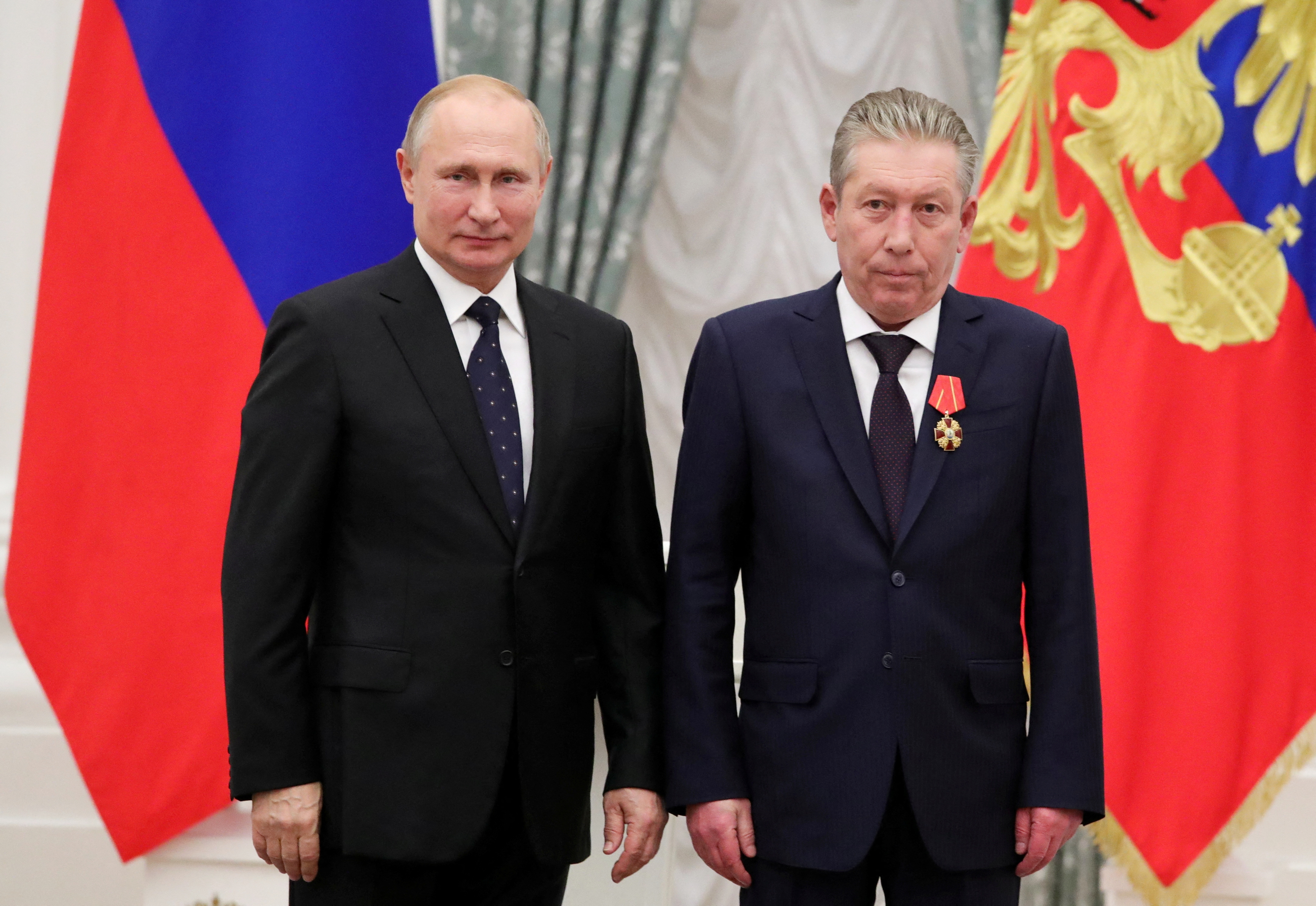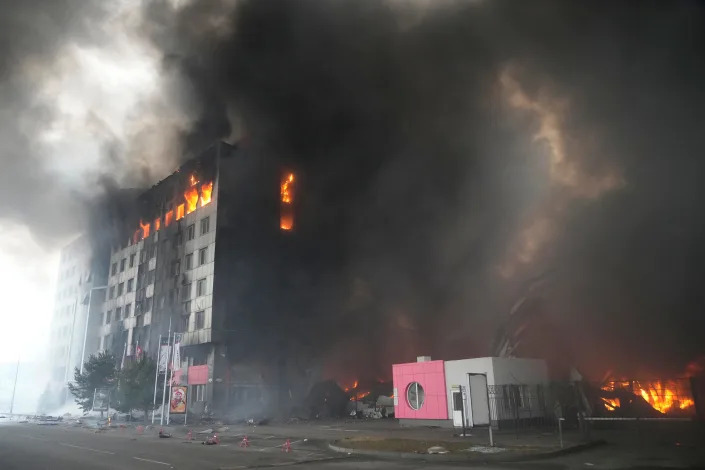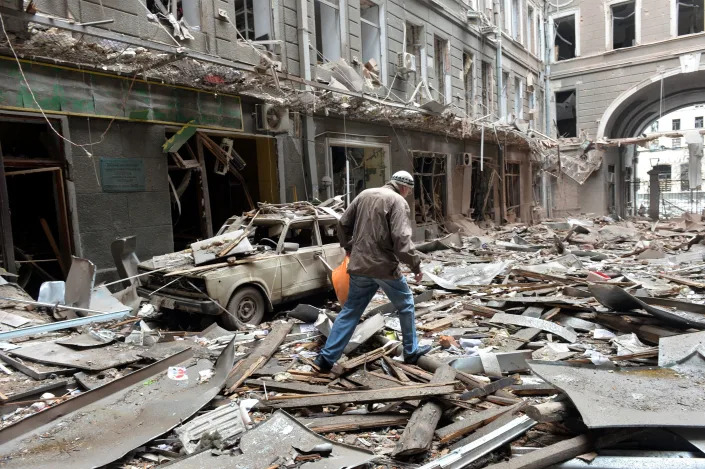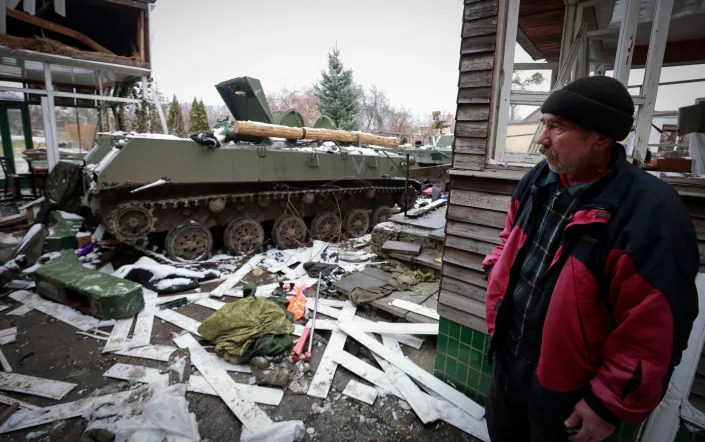
Trump and Musk
|
On Trump and Putin
|
Newspaper & online reporters and analysts explore the cultural and news stories of the week, with photos frequently added by Esco20, and reveal their significance (with a slant towards Esco 20's opinions)

Trump and Musk
|
On Trump and Putin
|
Russian President Vladimir Putin claimed occupied territories in Ukraine as part of the Russian Federation, blasting the U.S. and its allies as “satanic,” hinting at his willingness to use nuclear weapons, and signaling a sharp escalation in the war as Kyiv vowed to recover its occupied lands.
The rules-based international order was a sinister Western design, he told his audience, one that was rooted in Russophobia. The West itself has “embraced Satanism,” forced drug addiction, gender ambiguity and “the organized hunts of people as if they’re animals” — the latter either a strange reference to American mass shootings or the popularity of Netflix’s “Squid Game.” Nevertheless, such a fallen civilization still had the wherewithal to try and colonize Russia and steal its precious natural resources, he continued before comparing the United States to Nazi propagandist Joseph Goebbels, accusing it of setting a “precedent” in being the only nation to use nuclear weapons. Then he quoted from his favorite Russian fascist philosopher, Ivan Ilyin: “I believe in the spiritual forces of the Russian people, their spirit — my spirit, its fate is my fate, its suffering is my grief, its flowering is my joy.”
Bringing Russian-controlled Luhansk and areas of Donetsk, Kherson and Zaporizhzhia under Moscow’s control after a series of disputed referendums is a pivotal part of the Russian leader’s war goals. It effectively provides Moscow a land bridge to Crimea, the peninsula that Russia annexed in 2014, which is home to its Black Sea fleet. Seizing Crimea represented the first action of its kind in Europe since the end of World War II, triggering Western sanctions against Russia and upending long-held assumptions about security on the continent.
Claiming the new territories intensifies the crisis in a way that could leave Mr. Putin short of viable off-ramps as the ground war begins to turn against Russia, analysts said.


Ukrainian President Volodymyr Zelensky has already pledged to retake the occupied areas, driving Russian forces from lands that he says are rightfully Ukraine’s. On Friday he asked NATO to expedite his country’s application to join the security bloc, saying Ukraine was already a de facto ally of the North Atlantic Treaty Organization, though U.S. Secretary of State Antony Blinken said Ukraine would have to follow the established process.
Western leaders, including President Biden, have been quick to condemn Mr. Putin’s move, however.
“He can’t seize his neighbor’s territory and get away with it. It’s as simple as that,” Mr. Biden said at the White House on Friday as the U.S. government announced fresh sanctions. “America is fully prepared with our NATO allies to defend every single inch of NATO territory. Every single inch. So, Mr. Putin: Don’t misunderstand what I’m saying. Every inch.”
Russian forces have suffered severe setbacks on the battlefields of Ukraine in recent weeks, however, pressuring Mr. Putin, analysts say, and prompting him to launch a mass mobilization of reservists, along with many other fighting-age men who have been swept up in the call-ups.
Many Russian men who have the resources to leave have already taken flights or crossed borders to Kazakhstan, Finland, Georgia and elsewhere to evade the mobilization. A rapid Ukrainian offensive has now retaken some 3,500 square miles of territory that Russia had spent months securing, with Ukrainian forces now pushing slowly toward Russian positions in Luhansk.
On Friday, they were close to encircling Russian troops in Lyman, a strategic town in eastern Ukraine, Russian military bloggers close to the Kremlin said. Russian forces remained in control of the town but faced a “high probability of retreat” from the area, said one of the bloggers, Roman Saponkov.
Losing Lyman, an important logistics hub for Russian forces, would be a major blow to the Kremlin’s war effort in eastern Ukraine.
Sporadic protests have flared across the country, including in some of the more remote regions. On Monday, a 25-year-old Russian man opened fire at a military-recruiting station in Siberia, critically wounding its commander, hours after another man rammed a car into the entrance of a different recruitment center then set it alight with Molotov cocktails.
How should world leaders approach Putin’s attempt to annex parts of Ukraine? Join the conversation below.
Instead of dwelling on the Russian military’s problems, Mr. Putin used his address to excoriate the West, to rapturous applause from the political leaders and government officials assembled at the Kremlin. In particular, he accused Washington of ignoring international law when it suited U.S. interests and of trying to cement America’s hegemony across the globe, at times veering into theological discussions of right and wrong.
“The dictatorship of the Western elites is directed against all societies, including the peoples of the Western countries themselves. This is a challenge to everyone,” Mr. Putin said, warming to his theme. “Such a complete denial of man—the overthrow of faith and traditional values, the suppression of freedom—acquires the features of a ‘reverse religion,’ outright satanism.”
Some regions had already begun distributing Russian passports before referendums were held over the past week to authorize the takeover. Ukraine and Western nations described the voting as a sham.
Opinion polls have suggested that military mobilization would be especially unpopular with Russians, but analysts have said Mr. Putin had few options given the extent of the Russian army’s losses, and a desire among Russian nationalists to deploy more resources to the front lines in Ukraine.
In the meantime, Moscow’s economic advantage over Ukraine is beginning to slip away.
After the invasion in February, Russia managed to weather a storm of Western sanctions thanks to a surge in energy prices, driving up the value of its currency against the dollar. But that windfall appears to be fading as prices fall as the global economic outlook deteriorates. Its federal government budget fell into deficit last month because of the falling revenue. Since then oil prices have declined further, and Russia has stopped most of its remaining natural-gas exports to Europe.
Mr. Biden called a series of leaks on the Nord Stream pipelines between Russia and Europe a “deliberate act of sabotage,” echoing an assessment delivered by NATO on Thursday. He didn’t say who he believes is responsible for the alleged sabotage and ignored follow-up questions from reporters. The president said he is working with NATO allies to investigate the incident and protect critical infrastructure.
The mobilization of some 300,000 additional soldiers, meanwhile, is placing more strain on the economy at a time when Ukraine is continuing to receive military and economic support from the West.

|

Russian president Vladimir Putin announced today that he is mobilizing the Russian population to fight Ukraine. Russian Defense Minister Sergei Shoigu put that number at 300,000 soldiers. At the same time, the legislature abruptly changed the laws to inflict harsh penalties on those who don’t report to military duty, who surrender, or who refuse to fight. Reports suggest that 20–40% of the soldiers from some units have quit.
The cost of airline tickets out of Russia immediately skyrocketed.
Having called for the territories Russia claims to hold referenda on annexation to Russia, and clearly expecting that those votes will call for annexation, Putin also said that “Russia will use all the instruments at its disposal to counter a threat against its territorial integrity—this is not a bluff.” He is arguing that he will consider any Ukrainian attempt to retake its own territory as an attack on Russia and has told his people that the West is responsible for the Ukrainian resistance to Russian conquest. He is threatening to use nuclear weapons to conquer Ukraine, in what seems an admission that Russia is on the ropes.
Putin began his attack on Ukraine in late February with the expectation it would be short and decisive. More than six months later, the Russian economy is in tatters, the armies are collapsing, and the future of Putin’s administration is uncertain.
President Joe Biden responded in a speech before the United Nations General Assembly in New York. He reminded his audience that the Ukraine crisis was “a brutal, needless war—a war chosen by one man…. This world should see these outrageous acts for what they are. Putin claims he had to act because Russia was threatened. But no one threatened Russia, and no one other than Russia sought conflict.”
Biden urged the world to stand firm against Russia’s aggression.
Ukraine’s rout of Russian forces this weekend is creating a new kind of political challenge for President Vladimir Putin: It undercuts the image of competence and might that he has worked for two decades to build.
On Sunday, the Russian military continued to retreat from positions in northeastern Ukraine that it had occupied for months. State television news reports referred to the retreat as a carefully planned “regrouping operation,” praising the heroism and professionalism of Russian troops.
But the upbeat message did little to dampen the anger among supporters of the war over the retreat and the Kremlin’s handling of it. And it hardly obscured the bind that Putin now finds himself in, presiding over a six-month war against an increasingly energized enemy and a Russian populace that does not appear to be prepared for the sacrifices that could come with an escalating conflict.
Sign up for The Morning newsletter from the New York Times
“Strength is the only source of Putin’s legitimacy,” Abbas Gallyamov, a former speechwriter for Putin who is now a political consultant living in Israel, said in a phone interview. “And in a situation in which it turns out that he has no strength, his legitimacy will start dropping toward zero.”
As Ukraine pressed its advantage Sunday, seizing towns and territory, Putin escalated the brutality of his campaign, a concession to the pro-war voices on Russian television and social media. Missile strikes on infrastructure across eastern and central Ukraine plunged parts of the country into darkness.
But it was unclear how far Russia — with its cyber, chemical and nuclear arsenals — might be willing to go to halt Ukraine’s momentum, even as the scale of the battlefield setback became clearer and more evidence emerged of disarray inside Russia’s ruling class.
Ramzan Kadyrov, the strongman leader of the Chechnya region in southern Russia that has sent thousands of its own troops to Ukraine, accused the Russian military of making “mistakes” and failing to explain the retreat to the public. Sergei Mironov, the leader of a pro-Putin party in Parliament, criticized the authorities for celebrating Moscow’s annual City Day this weekend, posting on Twitter: “It cannot be and it should not be that our guys are dying today, and we are pretending that nothing is happening!”
“Because of some mistakes unknown to us, control over political processes is being lost,” a pro-Kremlin analyst who often appears on state television, Sergei Markov, said on social media. “I guarantee you that this confusion will not last long. But right now, it’s a mess.”
The fundamental problem, analysts said, is that Putin’s penchant for misleading his own people is catching up to him. The reality of the Russian setback is poking holes in the Kremlin’s message that the Russian army is undefeatable, Ukraine is riddled with corruption and cowardice and Putin is a brilliant geopolitical strategist. It was just last Wednesday that Putin declared that Russia had “not lost anything” as a result of the war, an assertion at odds with Western estimates of tens of thousands of Russian casualties.
For now, the war’s supporters have mainly directed their anger over this weekend’s setbacks at Moscow bureaucrats or at the military leadership. But an early indication that the frustration could damage Putin’s own prestige came on the Telegram social network after Moscow went ahead with a grand fireworks display Saturday evening to mark the 875th anniversary of the city’s founding — a slap in the face to the Russian military, some said, on perhaps the most humiliating day for Russia since the invasion began Feb. 24.
“We won’t support this government in the 2024 elections,” the administrators of a pro-war Telegram account with more than 400,000 followers said, referring to Russia’s next presidential election. “It’s been a long time coming, but this is the last drop.“
The discontent was evident even in Moscow, a city that the authorities have worked to shield from the costs of war.
As Moscow residents celebrated the city’s birthday this weekend with concerts and block parties, Vladislav, a taxi driver who moved to a city near Moscow from the Krasnoyarsk region in Siberia, looked upon all of the celebratory flags and stages with a bit of scorn. He said his 34-year-old cousin had been killed two weeks ago near Donetsk in Ukraine’s Donbas region, after having been conscripted into the pro-Russian forces.
“Here, people are drinking late through the night,” he complained Sunday morning after a weekend of revelry in the city. “No one cares about what is happening on the front.”
Tatiana Stanovaya, a Russian political analyst, said the Kremlin’s decision to play down the intensity and scale of the war in Ukraine had created parallel worlds: the reality of Europe’s biggest land war in generations on the one hand, and the business-as-usual atmosphere in Moscow. on the other.
The strategy to describe the war as a “special military operation” that need not affect most Russians’ daily lives relied on the expectation that Russia would quickly win it, she said. But with setback after setback, the fact that things are not going according to plan is becoming increasingly difficult to hide.
“The Kremlin, in principle, based its entire policy on the idea that there can be no defeats,” she said. “They didn’t prepare for the fact that there could be a collision with this second parallel world.”
There were signs Sunday evening that the Kremlin was responding to the criticism that it was not being honest with the public about the extent of the recent setbacks. On the main weekly news show on state television, the presenter Dmitri Kiselyov described the last week as “probably one of the most difficult” since the start of the war.
“Under the onslaught of superior enemy forces, the allied forces were forced to leave the previously liberated settlements,” Kiselyov said, referring to Russia’s “alliance” with Kremlin-backed separatists in eastern Ukraine.
It was a rare acknowledgment on the airwaves of what pro-Russian military bloggers have been warning about for weeks. With the Kremlin appearing determined to avoid a nationwide draft to increase the ranks of its army, Russia’s forces are outnumbered by the Ukrainians in many parts of the front line.
There were also signs that the Kremlin could be trying to escalate its military campaign, as supporters of the war have long said it should. A Russian strike knocked out power and water Sunday evening to much of the northeastern city of Kharkiv, the city’s mayor said, referring to the attack as an act of “revenge.”
“It seems it’s time to get rough,” the host Vladimir Solovyov said on his state television talk show earlier Sunday, complaining that Russia had not done enough to break Ukraine’s military and fuel supply lines. “It’s just time to get rough.”
How badly this weekend’s battlefield setbacks hurt Putin politically will depend most of all, of course, on his ability to reverse them, while continuing to shelter Russians from the consequences of Western sanctions. This week, Putin is expected to meet with President Xi Jinping of China at a regional summit in Uzbekistan, seeking to expand a critical relationship for Russia as it pursues economic partners outside the West.
Gallyamov, the former speechwriter, said the struggles in Ukraine could lead the elites around the Russian president to push for a successor to be appointed.
“If they continue to destroy the Russian army as actively as they are now,” Gallyamov said of Ukraine’s forces, “then all this can accelerate even faster.”
'No good outcome': Ukraine: Putin's war on Kyiv turning into long slog of death, despair
WASHINGTON – Russian President Vladimir Putin faces a critical juncture in the week-old war he started in Ukraine.
Bad choices, of his own making, are all he has left, experts said.
Unleash the full fury of firepower he's amassed on Ukrainian cities, and Putin risks killing thousands of civilians and destroying homes, buildings and roads. Surround the population centers, choke off water, food and electricity, and Putin assembles the ingredients for a humanitarian catastrophe. Send in ground forces to take control, and Putin invites a blood bath that kills Ukrainians and sends troops in body bags back to Russia.

Putin's initial plan unraveled, resting on the assumption that Ukrainian officials and troops would capitulate quickly. Instead, the spirited resistance from Ukrainians and poor performance by his own troops have left Putin and his military commanders frustrated and behind schedule, according to a senior Defense Department official.
The Pentagon and military experts expect Putin's forces to regroup, encircle cities and lay siege, shelling and bombing them until they surrender. The Russians will probably seize control of the cities, but deep, hardened resistance awaits them.
More: How Russian attack on Ukraine's Zaporizhzhia nuclear plant unfolded
More: Mapping and tracking Russia's invasion of Ukraine
"Then it's kind of a giant Alamo," said Colin Smith, an expert on the Russian military at the Rand Corp. "It's an Alamo (Ukrainians) can sustain for quite a long time if they've got the ammunition. They have the deepest subways in the world. It's their backyard. They could fight for a very, very long time."

Food and fuel shortages, along with poor training, have contributed to poor morale among Russian troops, according to the defense official who spoke on condition of anonymity to discuss intelligence findings. The main Russian force arrayed against Kyiv remains stuck about 15 miles from the city's center.
"There's enough evidence that there are Russian soldiers who do not want to fight and are not on board with killing Ukrainians," Smith said. "There's equipment that's been left behind, and they didn't just run out of gas. There's equipment that's been just left behind wholesale – perfectly working equipment – with no Russian soldiers in sight."

Even if Russian forces overrun major cities, the invasion force of 190,000 troops in and around Ukraine is not large enough to control a largely hostile population of more than 40 million, said Seth Jones, senior vice president and director of the international security program at the Center for Strategic and International Studies.
"It will likely be difficult for the Russian army to hold territory for long with such a small ratio of soldiers to local inhabitants," Jones said. "High numbers of troops are critical for establishing law and order."
Another problem for a Russian force spread too thin: Ukraine's open western border, through which U.S. and NATO allies have funneled weapons, ammunition and supplies. In the past week, up to $240 million worth of arms, including anti-tank missiles, crossed into the country, according to a second senior Defense Department official.

"Russian forces are unable to interdict the growing flow of anti-tank missile systems, surface-to-air missile systems, fighters, artillery, small arms, ammunition and other material flowing into Ukraine," Jones said. "There is virtually no case since World War II of an occupying army successfully pacifying a local population when the insurgency has support from a great power."
Smith raised a darker possibility: Putin has no interest in occupying Ukraine. Instead, Smith said, he wants to crush its government and military, leaving a country incapable of aligning with or joining NATO, even though that is not an imminent possibility.
"I don't think Russia could ever control Ukraine," Smith said. "That was never their intent. I think they just honestly want Ukraine to be a buffer. Regardless of what government goes back into Ukraine, Ukraine has been left so decapitated it can’t field a viable military. It's not going to join NATO, or NATO decides against even considering it. You've created a wasteland buffer."
More: US and allies look to seize Russian oligarchs' megayachts among sanctions for Ukraine war
Putin will attempt to convince Russians that the war in Ukraine was waged to prevent NATO from threatening Russia.
"Can he sustain the spin to stay in power? That will be determined on how long this conflict goes on," Smith said. "Time is on Ukraine’s side. Every day that you can stand in his way is in their favor. But it's also another day that another building and hundreds of civilians are at risk. There's no good outcome at this point."
This article originally appeared on USA TODAY: